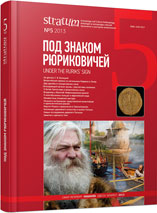«Блуждающий каганат русов»: перспективы дальнейшей полемики
“Wandering Khaganate of the Rusi”: Prospects for Further Debate
Author(s): Sergey V. TomsinskySubject(s): History, Political history, Middle Ages, 6th to 12th Centuries
Published by: Издательский дом Stratum, Университет «Высшая антропологическая школа»
Keywords: Eastern Europe; 9th с.; “Khaganate of the Rusi”; problems of location; problems of chronology; written sources; archaeological sources
Summary/Abstract: The four hypotheses interpreting some short accounts of 9th c. on the “kaghanate of the Rusi” that existed in Eastern Europe — so called “Northern”, “Dnieper”, “Azov” and “Don” hypotheses — recognize real existence of this form of state and, even more, that this state led an active foreign policy in adjacent and remote territories. Meanwhile, the available information does not suggest that these accounts allow univocal interpretation; accordingly, the arguments invoked in support of various findings by the authors of these hypotheses cannot be related to “Annales Bertiniani” or accounts of Muslim writers. Leaving beyond doubt the mere fact of some Scandinavians presenting themselves as envoys of “Kaghan of the Rusi” at the court of Louis II in 839, as well as recognizing that Islamic countries could know something about this “kaghan”, we still have no grounds to make any more definite conclusions. The Rusi were present and active in Eastern Europe, a certain “kaghan of the Rusi” declared himself in Byzantium and Germany in 839 and thus was remembered by informants of Muslim geographers — but the “kaghanate of the Rusi” could be a failure due to some reasons, and existed just as long as the “kaghan”.
Journal: Stratum plus. Археология и культурная антропология
- Issue Year: 2013
- Issue No: 5
- Page Range: 275-281
- Page Count: 7
- Language: Russian
- Content File-PDF

